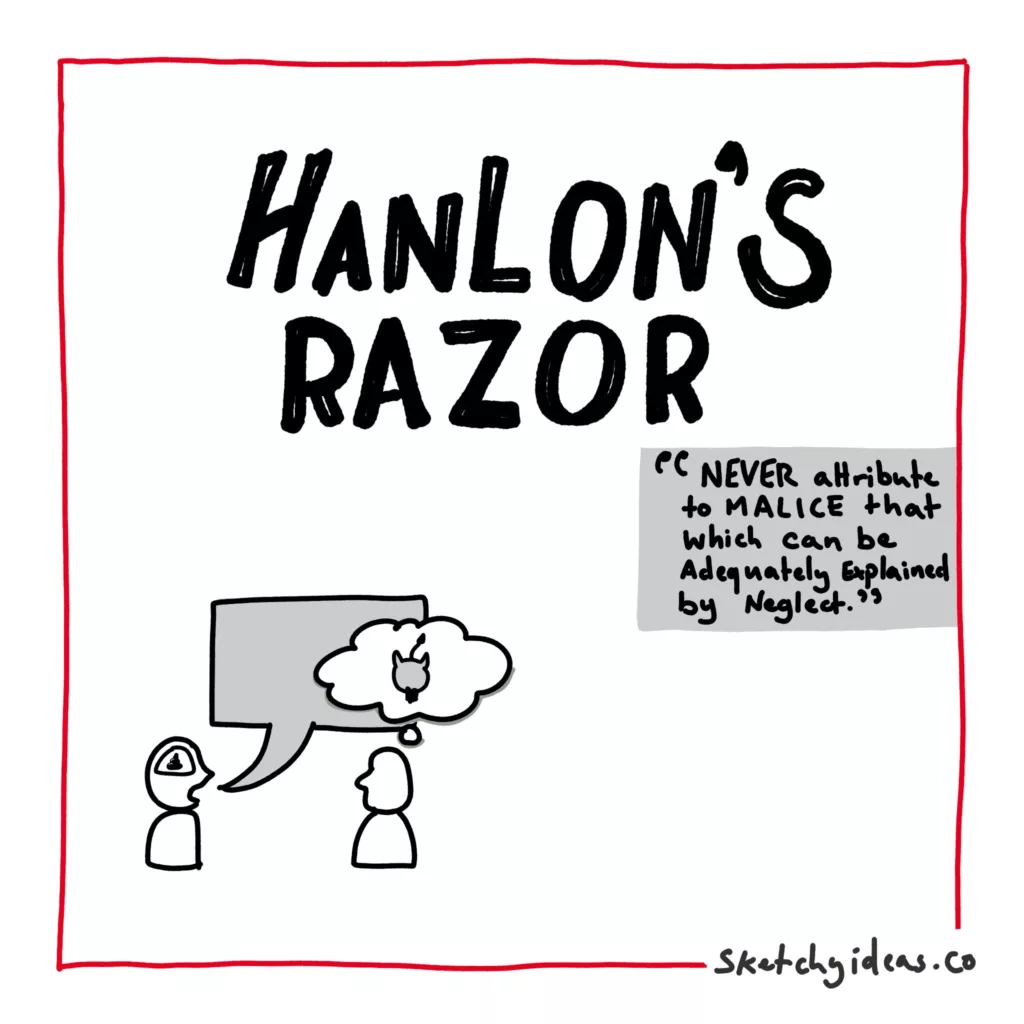When was the last time you felt like someone was upset with you or out to get you?
Perhaps they didn’t include you in a discussion, maybe they said something disrespectful, or perhaps their actions were harmful. It’s easy to understand why you might feel they were out to get you.
But is that really the case? A simple mental model suggests that it probably isn’t.
Enter Hanlon’s Razor.

What is Halon’s Razor?
Hanlon’s Razor is a lens for looking at human behaviour that reminds us the simplest explanation is usually the most likely. It says:
“Never attribute to malice that which is adequately explained by stupidity.”
Robert J. Hanlon
We often assume ill intent — that someone is out to hurt, manipulate or take advantage of us when there’s usually a more straightforward explanation. An example, if you weren’t invited to a meeting, it’s more likely that they either forgot, had a technical issue or perhaps didn’t think it was essential for you to; the least likely is that they were trying to gain leverage over you.
Halon’s razor encourages empathy and understanding and an abundance mindset as we navigate our relationships.
Why does it matter?
The mindset behind Halon’s razor is essential for healthy relationships.
When we assume mistakes over malice we avoid escalating conflicts unnecessarily. We enter challenging situations open to hear from the other person and that helps us all move forward.
This doesn’t mean we should trust everyone or accept every explanation, but we shouldn’t jump to assumptions of intent. Instead, we can focus on what happened and discuss that.
Going back to our example of not being invited to a meeting, when we focus on the possible malicious intent, we may get defensive, make rude comments or even try to exclude the person in return. If, however, we focus on the action, not the intent, we may simply ask why we were invited, hear their reason and then we can respond in kind.
3 ways to apply Hanlon’s Razor in our daily lives
Here are some practical strategies:
1. Cultivate empathy
Empathy is an underrated superpower.
Being able to put yourself in someone else’s shoes and see things from their perspective can help you understand actions that seem strange at first. It’s also key for helping people effectively.
2. Seek clarification
A quick question can avoid a lifetime of confusion.
By giving a person a chance to explain themselves, we can alleviate our fears, resolve misunderstands and find out when we really should be worried.
3. Assume good intentions
I once heard someone say
We judge others on their actions, not intentions; we judge ourselves on our intentions, not our actions.
Much of the issues Hanlon’s razor solves come because we focus too much on their actions and assume the wrong intentions. If we instead assume good intentions, as we wish would be done for ourselves, we can avoid these issues.
And by doing so we provide space for people to make mistakes and grow without needing to feel defensive.
Assume good intentions for better relationships
Embracing Hanlon’s Razor makes us open to building better relationships, helps us forget deeper understandings of one another, and reduced the stress and anxiety we feel when actions go against us. Instead of leaping to conclusions, let’s remember that mistakes are the most likely explanation.

Leave a Reply